- Home
- Roy J. Snell
Riddle of the Storm
Riddle of the Storm Read online
Produced by Stephen Hutcheson, Rod Crawford, Dave Morganand the Online Distributed Proofreading Team athttps://www.pgdp.net
_A Mystery Story for Boys_
Riddle of the Storm
_By_ ROY J. SNELL
The Reilly & Lee Co. Chicago
COPYRIGHT 1932 BY THE REILLY & LEE CO. PRINTED IN THE U. S. A.
CONTENTS
CHAPTER PAGE I The Gray Streak 11 II In Swift Pursuit 36 III Trailing the Gray Streak 55 IV Pitchblende 65 V Racing the Storm 77 VI A Shot in the Night 87 VII The Winged Messenger 96 VIII White Foxes 105 IX Eagle Eyes 118 X The Voice of the Wilderness 124 XI The Clue 131 XII The Voice Speaks 137 XIII Curlie Sleeps on the River 144 XIV Drew Lane on the Wing 151 XV Over the Rapids 168 XVI Pawns 184 XVII "Here's Hoping" 191 XVIII Fluttering from the Clouds 197 XIX A Three Days' Quest 203 XX The Hunchback Bowman 208 XXI Bowled Over Like a Tenpin 216 XXII Great Good Fortune 229 XXIII Whither Away? 237 XXIV A Face at the Window 245 XXV A Pocketful of Gold 258 XXVI Walls of Light 269 XXVII The Black Cube 281 XXVIII Joy Cometh 296
RIDDLE OF THE STORM
CHAPTER I THE GRAY STREAK
Curlie Carson's eyes widened first with surprise, then with downrightterror. His ears were filled with the thunder of a powerful motor. Yes,he heard that. But what did he see? That was more important. A powerfullybuilt monoplane with wide-spreading wings was speedily approaching. Eventhrough the swirl of snow all about him he could see that the plane waspainted a solid gray.
"The 'Gray Streak'!" he murmured.
Could it be? What tales he had heard of this mysterious plane! During histhree weeks of service on the _Mackenzie River Air Route_ in northernCanada, extravagant tales had reached his ears. "This gray plane bears noidentification mark, no name, no letters, no numbers. It swoops down uponsome lone cabin, robs the owner of food and blankets, and is away. It isa phantom ship, a Flying Dutchman of the air. No pilot at the stick!"What had he not heard?
But now--now it was directly over him. Cold terror gripped his heart. Apart, at least, of the reports was confirmed; the plane carried noinsignia. No name, no letter, no number gave it identification. And thesewere required by law.
"The 'Gray Streak'," he murmured again.
His fear increased. The plane was flying low along the river. He wasstanding close to his own plane, the one entrusted to his care by the_Midwest Airways_. It was a superb creation, and almost new. Suppose thisstranger, the man of mystery, outlaw perhaps, should drop to the smoothsurface of the river's ice and compel him to exchange planes!
"Suppose only that he should descend to rob me of my cargo!" His heartraced. It was a valuable cargo and had come a long way by air.
While these terrifying possibilities were passing through his mind, theplane moved steadily onward. He was able to study every detail: herskids, her wings, her cabin, her motor.
The drumming of her motor did not diminish.
"They are passing!" he whispered. "Thank God, they are going on. I--"
His words were checked at sight of some white object that, whirling withthe wind, seemed at first a very large snowflake.
"But no. It--it's--"
He was about to dive forward in pursuit of it when an inner impulse bornof caution caused him to halt.
Dividing his attention between the vanishing plane and the flutteringobject, he stood for a space of seconds motionless. Then, as the snow-fogclosed in upon the plane, he dashed forward to retrieve a small square ofcloth.
"A handkerchief!" He was frankly disappointed.
"But--a woman's handkerchief." His interest quickened. One did notassociate a woman with this mystery plane.
"Perhaps, after all, it's a boy's," he told himself. "But a boy? One--"
His eyes had caught a mark in the corner. There were words written there,very small words.
Hurrying to his airplane, he climbed into the cabin; then, switching on apowerful electric torch, he studied the words.
"I am a captive," he read.
And beneath this was a name: "D'Arcy Arden."
"D'Arcy," he murmured. "What a strange name! Would it be a boy or agirl?"
For a long time he sat staring at that square of white, trying at thesame time to patch together the rumors that had come to him regardingthis mystery ship of the air.
"No use," he told himself. "Can't make head nor tail of it."
The truth was that until that hour no aviator of this northern countryhad laid eyes on this gray phantom. They had one and all agreed that itdid not exist, that it was the creation of an over-wrought imagination;that some mineral-hunting plane on a special mission had passed over hereand there and had created the illusion.
"But now," he assured himself, "I have seen it. I will vouch for it. Andhere," he held the square of white up to the light, "here is the proof!
"But why is that plane here? Where is it going? Why is that person acaptive? What type of outlaw rides in that cockpit? All that is theriddle of this storm, a riddle I am bound to aid in solving. But now--"
His ears caught the beat of snow on the cabin window. "Now there isnothing left but to eat, sleep a bit, and wait out the storm.
"Get a bite to eat," he told himself. "Something hot. Fellow has to keephimself fit on a job like this, when you--"
He did not finish. A sudden thought breaking in upon him had startledhim. He had believed himself safe from the peril that had threatened. Butwas he? What if the plane turned about and came back?
He opened the cabin door. The throb of a motor smote his ear, and oncemore sent tremors of fear coursing up his spine.
Once more consternation seized him. What was to be done? He couldn't losehis plane. He must not!
"Only three weeks," he said aloud, "and then!"
It had been a glorious three weeks. Rising off the field at Edmonton.Greeting the dawn. Skimming through the clouds. Sailing over a greatwhite world, ever new. This was his task as a northern pilot.
"So safe, too," he had said more than once. "The river's ice, a perfectlanding field, always beneath you."
No, he could not lose his plane. Reaching up to a niche at the top of thelow cabin, he took down a powerful yew bow and a handful of arrows. Thearrows were
of ash, light and strong. They were perfectly feathered.Their points were of razor-edged steel. "Might help in an emergency," hetold himself. "And this D'Arcy person might be able to do a little if Icould free him. Even if it were a woman, she might help; you never cantell."
The pulsating beat of motors grew louder.
"If I lose my plane it means we lose the mail contract. I won't!" He sethis lips tight. "I must not!"
Gripping his bow, he stepped out of the cabin.
The next moment his face broadened in a grin.
"Fooled myself!" he exclaimed.
The plane that loomed out from the snow-fog for a space of seconds, onlyto lose itself again, was not gray. It was blue, with streaks of white.It bore on its wings the letters E F--R A C.
"Speed Samson," he murmured. "He's going through. He trusts his motors."
A frown overspread his usually cheerful face. The frown had a meaning. Headmired Speed. Speed was a wonderful pilot with thousands of hours offlying to his credit. Yet Speed had, only three days before, disappointedhim. Perhaps disappointed is not the word. However that may be, this iswhat had happened. Curlie had said,
"You have to learn to trust God in a very real way when you fly in theNorth, don't you?" He had not meant to preach; but Speed had said rathershortly:
"I trust my motors!"
"He trusts his motors," the boy repeated. "'Trust God and keep yourpowder dry.' Some one has said that. Up here you have to trust God andkeep your motors right. But I for one am not going to trust to my motorsalone. God made the iron and steel, the copper and all that goes into mymachine. He made the gas and oil, too. And He made my brain, and I'll useit to the best of my ability. This is not safe flying weather. And ordersare, 'Always play safe.'"
Having thought this through, he returned to his cabin.
"Danger is all over," he told himself. "But this D'Arcy person? How I'dlike to help! Wonder if I will in the end?"
"Hot chocolate," he murmured to himself. "A cold chicken sandwich and abig pot of beans, warmed over the alcohol stove. Boy! A fellow sure doesget an appetite up here!"
An hour later, wrapped in his eight foot square eiderdown robe, he lay onthe floor of the narrow cabin prepared for sleep.
Sleep did not come at once. There were many troubles of the day that mustfirst be put to rest. He thought of his motor, going over it piece bypiece. In this land of the North much depends upon the pilot's care ofhis motor. Curlie was not neglectful. Even in his hours of repose histhoughts were upon his task.
That his was a position of grave responsibility he knew right well. Untilhis coming into this land he had thought of aviation as a pleasantluxury, mostly to be indulged in by the rich and the near-rich; anecessity in war, a luxury in time of peace. But in this far-flung landof snow the airplane has come to be a thing of great service. Journeysthat required three months of hard mushing after dog teams; of sleepingin rough, uninhabited cabins at night; of facing cold, hunger anddarkness, are now accomplished with great comfort in three days. In thisland the airplane has made a village a thousand miles from Edmonton oneof that city's suburbs. Curlie had not been slow to sense all this.
"And there's gold," he told himself. "'Gold hunters of the air.' That'swhat Johnny Thompson called them. I wonder how it's done."
Yes, Curlie had seen Johnny Thompson. You remember Johnny. He had beenCurlie's pal in more than one strange land and with him had participatedin many a mysterious and thrilling adventure.
He had not come upon Johnny this time by accident. Neither was Curlie'spresence in northern Canada an accident. He was here because he had afriend, and that friend was Johnny Thompson.
Curlie, like many another young fellow, had bumped squarely into theregretted "depression" that, sweeping like a tidal wave over the land,had left many a man high and dry, with no home and no place to eat.Having been in the air mail service in America, he was dropped whendemand slackened and fewer men were needed. Men who had more flying hoursto their credit had been retained.
In time of depression one must often rely upon his friends. Little groupsof true friends, drawn closer together by the winds of adversity, standback to back, fighting the battle together.
So it happened that Johnny, finding himself in the North and learning ofa temporary vacancy, spoke a good word for his friend Curlie Carson.
"And now," thought Curlie, "here I am. And here I stay until my lastdollar is spent. A land where airplanes are a real necessity, that's theland for me!
"'Gold hunters of the air,'" he repeated once more. "Wonder how they doit? Perhaps I'll learn that business. Sounds thrilling. And gold! Man! Itmight make a fellow rich!
"But I wonder--"
He had asked Johnny how it was done, this gold hunting in the air. Johnnyhad said,
"How much time you got to spare?"
"Two minutes. Must get back to my motor," Curlie had replied.
"Not enough by two hours," had been Johnny's laughing rejoinder. "Drop inand stay all night on your next trip and I'll tell you all about it.
"And by the way!" he had exclaimed. "Be sure not to pass us up on thatnext trip. May have something mighty important to send down by you. Newstuff; that is, new to us. Worth about a million dollars an ounce. Howdoes that strike you between the ears?"
"Million an ounce," Curlie murmured sleepily. "Million dollars an ounce!Wonder what that could be?"
* * * * * * * *
Curiously enough, at the very hour in which Curlie had decided to sleepout a storm, Johnny Thompson, many miles away in a place where the stormhad not yet struck, was telling some one else, an old-time friend ofCurlie's as well as his, some things about gold hunting in the air. Hewas talking in no uncertain terms, and the facts he revealed were as mucha surprise to the listener as they might have been to Curlie.
He had left his camp early that morning, had Johnny. It was well into theafternoon when, as a sudden smile spread over his close-knit,winter-hardened face, he sighted the person he had hoped to meet.
A slim girl in her teens, this girl handled her dogs extremely well for anovice who had been in the North only three short weeks.
"Bravo!" Johnny fairly shouted, as she rushed ahead to seize her leaderand throw him back on his haunches. "She picks things up quickly. Many agirl would have allowed her team to come straight on to mine. Then ourteams would have mixed, her team against mine, like two football teams ona gridiron. Best team wins. What a rumpus that would have been! Badbusiness. Dogs all crippled up, like as not."
Swinging his own dogs off the trail, he issued a sharp command which theyinstantly obeyed by throwing themselves upon the hard-packed snow in aposition of repose. Dog teams in the North were not new to Johnny, thoughthis was his first trip into the far northwest of Canada.
The girl, who stood silent and expectant beside her team, was JoyceMills. Johnny had learned of her presence in the North quite by accident.For months he had not heard from her nor from her father, Newton Mills,the retired city detective. You will remember Joyce and her father wellenough if you have read _The Arrow of Fire_ and _The Gray Shadow_. Abrave, resourceful, independent girl, this Joyce Mills. And her father,before a nervous breakdown, had been one of the most feared detectives onthe New York force. Now, here they were in the North. Strange, do yousay? In this day nothing is strange. "Foot loose and fancy free," that'sthe phrase. We go where we will, we Americans.
Joyce had not known Johnny was in the North. And now here they stood faceto face.
"Jo--Johnny Thompson!" she breathed, her eyes widening as he approached.
"Johnny!" she cried aloud. "When did you get here?"
Johnny grinned broadly. "Three weeks ago to-day, same as you."
"Three--three weeks. And you knew I was here!" Her eyes reproved him.
"Not until yesterday," he explained. "Of course I knew there was a ladyin your outfit. Yesterday an Indian told me who you were."
"An Indian. I haven't talked to one. How did he know my name?"
"Knew me!" A puzzled look overspread the girl's face. "I don'tunderstand."
"You wouldn't unless you knew Indians. In their own way they are cleverbeyond belief; some of them at least. They see everything, can imitateevery action, your smile, your gestures, your walk, everything. They candescribe the fillings in your teeth, the shape of your fingers and everybit of toggery you wear. This man had not been speaking three minutesbefore I knew it must be you."
"Indians," she murmured as Johnny came closer to her sled. "Are they asclever as that?"
"They sure are!"
"But, Johnny!" she exclaimed. "What are you doing here? And how does ithappen that we arrived on the same day?"
"I am doing," said Johnny slowly, "just what your outfit is doing,searching for mineral, gold, silver, platinum, radium.
"As for that other question--" His words came with great hesitation."That--that's a deep secret. I wonder if you know the answer yourself.No. I am sure you don't, nor your father either. You are square shooters,you are. Your father is the straightest detective that ever guarded thestreets of New York. He wouldn't be in on a thing like that, not if heknew it."
"Johnny!" the girl cried out in alarm. "What are you saying? Are youtelling me that in our camp some one is unfair, dishonest? How could theybe? We are searching for mineral in a wild, open country that belongs tono one save the Provincial Government. How could we be dishonest?"
"And yet," Johnny said as he sat down upon the sled, "a very mean trick,yes, a dishonest, dishonorable one has been played by--. Not by yourfather," he hastened to explain, "but by at least one of the young menwith whom he is associated.
"Sit down and I will tell you."
The girl sank to a place beside him.
"Listen." His tone grew impressive. "You have seen those enlargedphotographs?"
"You mean the ones taken from the air, showing the surface of rocks, thesides of ledges, the ones our men work by? The ones they study and findsigns that save them months of travel?"
"Yes."
"I have seen them many times."
"Then you know," the boy went on, "that they are invaluable as an aid inthe search for mineral, that an expert mineralogist like your father cansit down before those photographs and can, after studying them carefully,tell where mineral is likely to be found.
"Of course," his voice dropped a little, "of course, a skilled observermay fly over the territory and tell something of the rock formation frommere eye observations. But photographs are much better.
"Did it ever occur to you," he demanded suddenly, "to ask yourself thequestion: 'Where did those photographs come from? Who took them?'"
Joyce started. "N--no, it didn't."
"I'll tell you. But first let me assure you that the taking of suchpictures is difficult, tiresome and often dangerous work. It requires agreat deal of time. Those prints are only a hundred or so selected frommore than a thousand. To take those pictures required many days ofsoaring in a powerful airplane, close to the surface of the earth. Forsuch work an airplane is expensive. Those pictures cost a pretty largesum of money. They were the property of two men, an aged prospector and ayoung man. They invested their joint fortunes in the undertaking, hopingfor large returns. They had made one enlargement from each film when allthe films were stolen."
"Stolen!"
"Stolen."
"By whom?"
"I leave you to guess."
The expressions that flitted across the girl's face, as clouds pass overa landscape, were strange to see. Despair, distrust, sorrow, hope, thendespair again--all these.
"My father," she murmured at last, "my poor father."
"He knows nothing of it. That goes without saying," Johnny hastened toassure her.
"But--but it's not that." She seemed undecided. There was a strangehoarseness in her voice as she turned her face to his.
"Johnny, you know my father."
"Yes," he replied simply, "I know."
He spoke the truth, as you will know if you have read that other book,_The Arrow of Fire_. Johnny did know Newton Mills. He knew that he hadbeen one of the finest detectives the city of New York had ever known. Heknew, too, that after many years of service he had fallen as a lastsacrifice to the battle against crime. Johnny had done much to reclaimhim.
"You know," Joyce went on, "that he can never again fill a post on a citydetective force. His nerves are too far gone for that. We are poor. Thedepression reached us. We were in despair. Then this opportunity came. Hemay never have told you, but he was in the Yukon gold rush. He found nogold, but instead, a lifetime hobby--the study of minerals. These studieshave fitted him for the work he is now doing. This opening came. He tookit. I came to be with him."
She said "with him" softly, did this slim, dark-haired girl. She lovedher father.
"And now," her tone changed, "now it's all over." There was no bitternessin her voice, only weariness, the long, long weariness of one who hasbattled long for a great and noble cause, only to feel that defeat liesdirectly ahead.
"I can't see it that way." Johnny spoke calmly. "The work can go on. Ifsomething really comes of it, your father will receive his full share."
"But who would want a share of anything obtained by dishonest means?" Thegirl's cheek flushed.
"Well," Johnny replied quietly, "in the first place, I doubt if all threeof the young men working with your father know of the theft."
"I am sure they don't!" the girl exclaimed, ready to weep. "It doesn'tseem possible that one of them could do such a thing. They seem sohonorable. They have been so very kind to me."
"And yet, here are the facts staring us in the face," Johnny continued."If you had our set of pictures to compare with those your people areusing, you would find them identical. And they were taken by Scott Ramseywho is one of the partners in our camp, a real gold hunter of the air."
"And one of our men is a thief!" the girl spoke slowly. "Who wouldbelieve that?"
"Your task," Johnny added gently, "is to find the thief. You are thedaughter of a detective. Often you have helped your father in his work.This should be easy."
"I will." The girl stood up. "I will find him. And when I have, whatshall I do?"
"Nothing."
"Nothing?" She stared unbelievingly.
"Exactly that. Can't you see?" He, too, sprang to his feet. "As long aswe know what they are doing, they are in a way working for us. If theymake a strike, find gold or other rich mineral deposits, we will sharewith them."
"You would take--"
"No. We couldn't take the claims they file on; at least we would not.They should have their share. I am sure the men of our camp will dealfairly, even generously with them.
"But this is the way it works." He was explaining quietly now. "If theymake a strike, find gold or radium, they will rush outside in an airplaneand bring in friends to file on the land. There will be room for many,many claims. When they have a broad stretch of ore-bearing territorystaked, they will sell out to some rich company.
"But you see," he added, "if they make a strike we will know it at once.Nothing prevents us from moving over and filing on the most promisingspots; in fact, it's the fair thing to do since they are working with ourpictures."
"I see." The girl spoke slowly. A new light of hope shone in her eyes.
"But, Johnny," she asked suddenly, "how will you know when they make astrike, if they do? You wouldn't expect me to--"
"No, we wouldn't expect you to let us know. But we have a way--theMoccasin Telegraph."
"Moccasin Telegraph? What's that?"
"You will learn much about that before you are here long." His eyes weresmiling mysteriously.
"And be assured of one thing," he added. "Whatever comes of it, yourfather will have his fair share."
"Sha--shall I tell him?"
"I think not. His work calls for all his energy. It might disturb him
.This is your case. Work it out. Find the man."
"I shall find him if--if there is such a one."
"If? What do you mean? The evidence is conclusive."
"I find it hard to believe."
"It is true." His tone changed. "I must be going. It's a long way to ourcamp." He put out a hand. She gripped it quite frankly.
"What brought you this far?" she asked.
"Thought I might see you. No ladies in our camp. Only a Chinaman for acook. Fellow gets lonesome."
"Shall you come again?"
"I think not. It's not safe. Feeling runs high in this land. Our crowdsmight mix in the wrong way. That would be bad."
"Well, so long, then."
"So long!"
A moment later Johnny and his team vanished behind the cliff, leaving avery much puzzled girl alone with her thoughts. And they were long, longthoughts, I assure you.

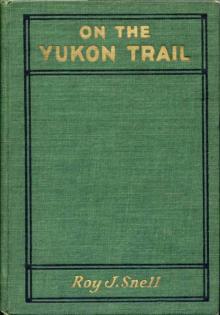 On the Yukon Trail
On the Yukon Trail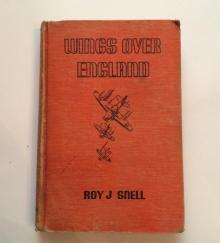 Wings over England
Wings over England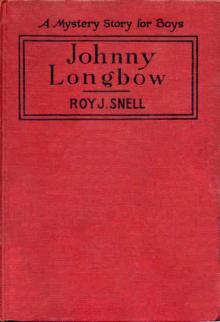 Johnny Longbow
Johnny Longbow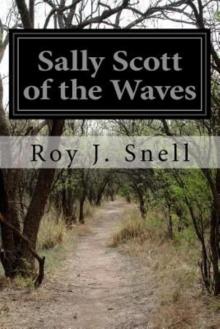 Sally Scott of the WAVES
Sally Scott of the WAVES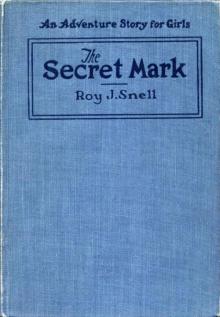 The Secret Mark
The Secret Mark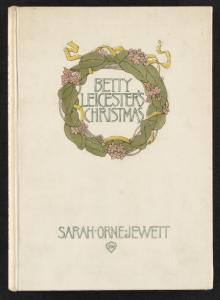 Betty Leicester's Christmas
Betty Leicester's Christmas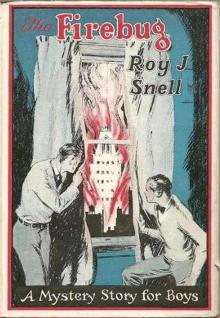 The Firebug
The Firebug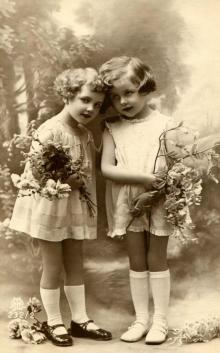 Minnie Brown; or, The Gentle Girl
Minnie Brown; or, The Gentle Girl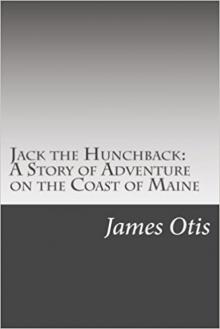 Jack the Hunchback: A Story of Adventure on the Coast of Maine
Jack the Hunchback: A Story of Adventure on the Coast of Maine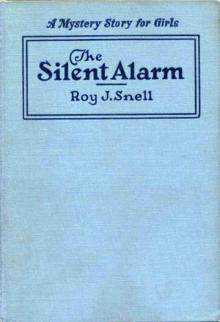 The Silent Alarm
The Silent Alarm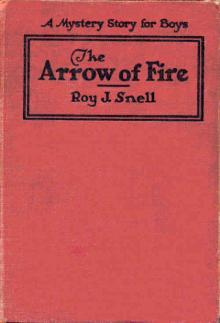 The Arrow of Fire
The Arrow of Fire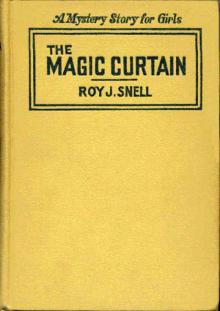 The Magic Curtain
The Magic Curtain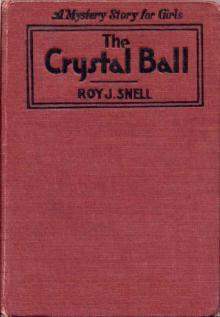 The Crystal Ball
The Crystal Ball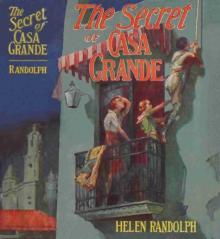 The Secret of Casa Grande
The Secret of Casa Grande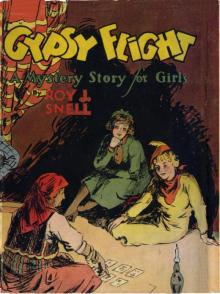 Gypsy Flight
Gypsy Flight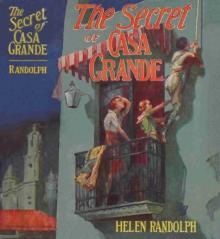 The Mystery of Carlitos
The Mystery of Carlitos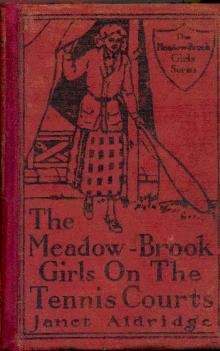 The Meadow-Brook Girls on the Tennis Courts; Or, Winning Out in the Big Tournament
The Meadow-Brook Girls on the Tennis Courts; Or, Winning Out in the Big Tournament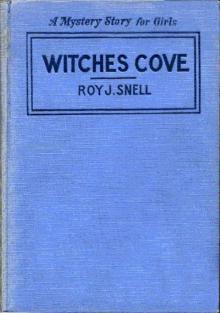 Witches Cove
Witches Cove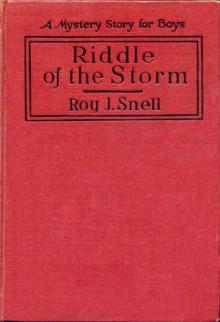 Riddle of the Storm
Riddle of the Storm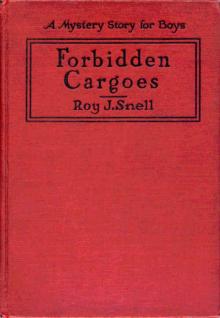 Forbidden Cargoes
Forbidden Cargoes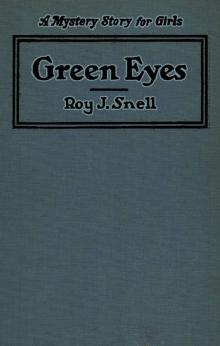 Green Eyes
Green Eyes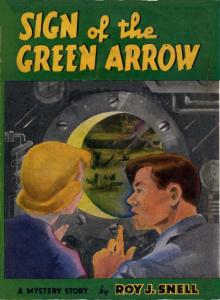 Sign of the Green Arrow
Sign of the Green Arrow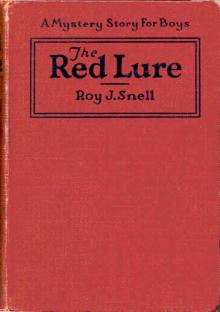 The Red Lure
The Red Lure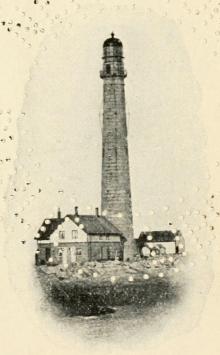 The Light Keepers: A Story of the United States Light-house Service
The Light Keepers: A Story of the United States Light-house Service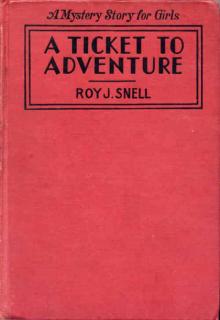 A Ticket to Adventure
A Ticket to Adventure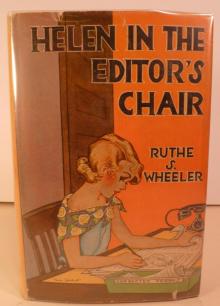 Helen in the Editor's Chair
Helen in the Editor's Chair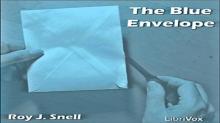 Blue Envelope
Blue Envelope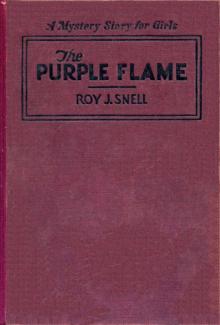 The Purple Flame
The Purple Flame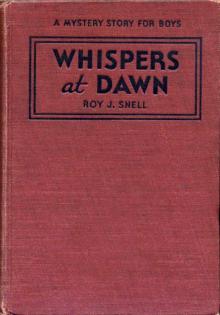 Whispers at Dawn; Or, The Eye
Whispers at Dawn; Or, The Eye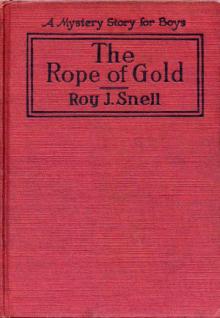 The Rope of Gold
The Rope of Gold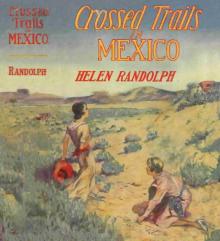 Crossed Trails in Mexico
Crossed Trails in Mexico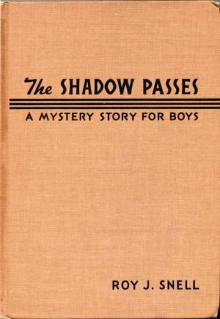 The Shadow Passes
The Shadow Passes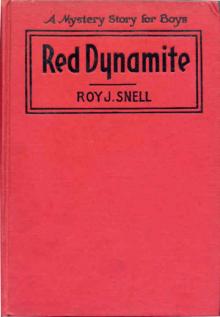 Red Dynamite
Red Dynamite Blue Grass Seminary Girls on the Water
Blue Grass Seminary Girls on the Water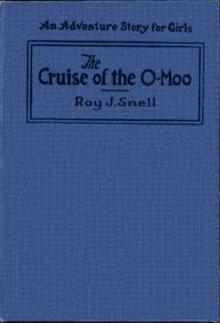 The Cruise of the O Moo
The Cruise of the O Moo